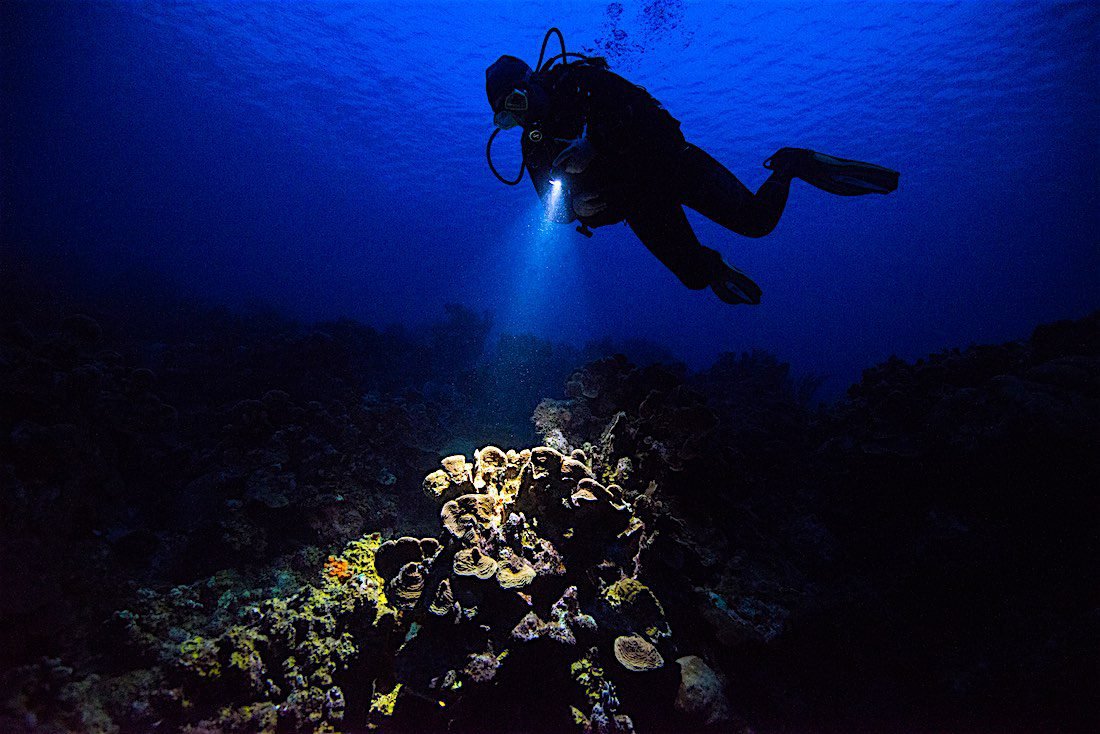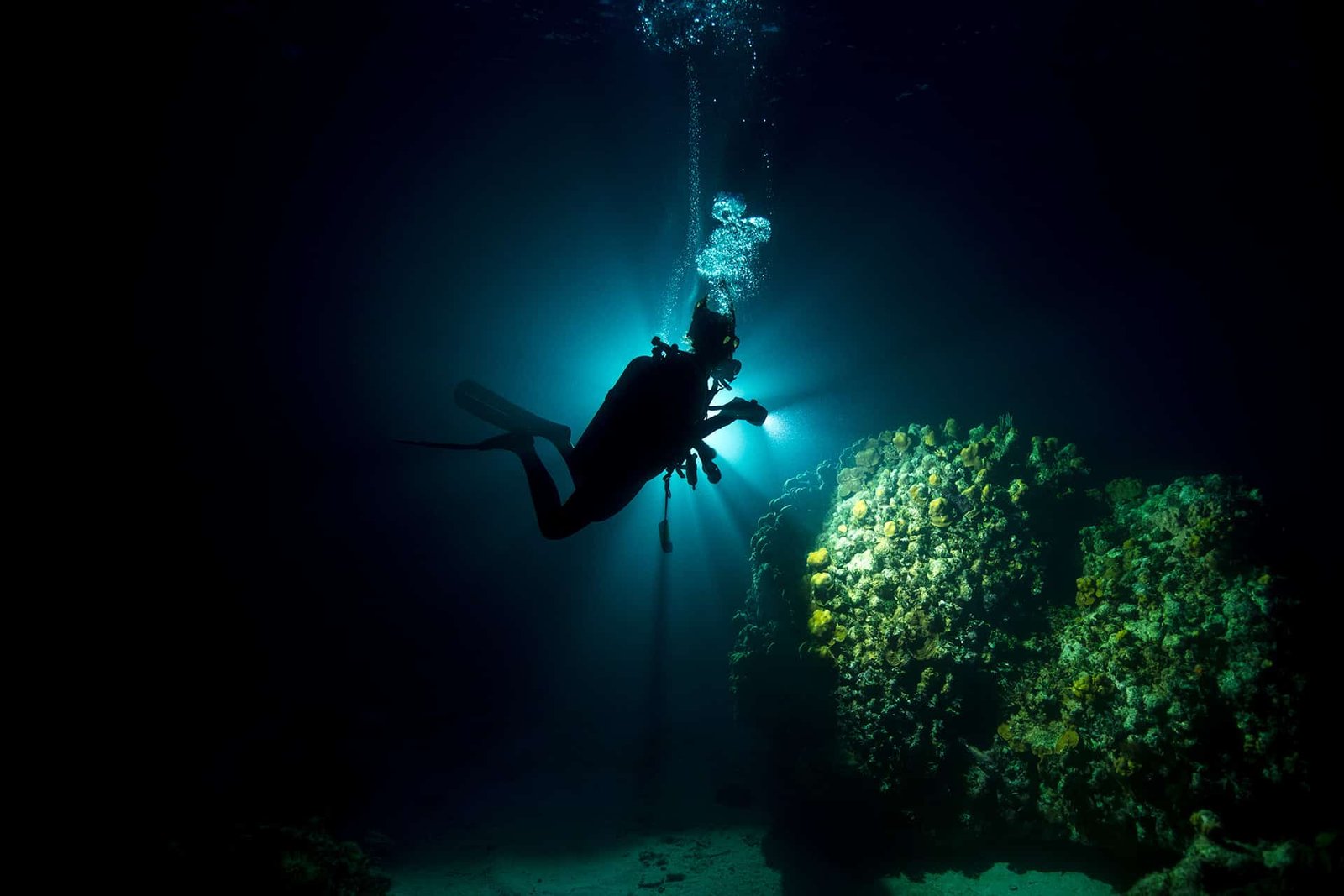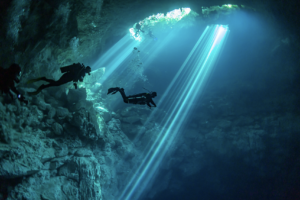Discover the captivating world of night diving, where marine life comes alive in the dark. Uncover the secrets of this unique underwater adventure, learn about equipment, safety, and the enchanting experiences that await you. Is night diving really as scary as it sounds? Find out in this blog!
Content:
What Is Night Diving?
Night diving is a special form of recreational diving that takes place after dark. Many consider it a fantastic experience, as divers can explore an underwater world that’s not visible during daylight.
Why Venture into the Depths at Night?
After honing your diving skills and exploring various underwater environments, the desire to dive at night naturally arises. Night diving offers a unique and exciting experience that significantly differs from daytime diving.
Diving in the dark provides an opportunity to witness an entirely different marine life, with many species that remain hidden during the day becoming active at night. This allows you to observe behaviors and encounters rarely seen during daylight hours.
Furthermore, the underwater atmosphere undergoes a dramatic transformation as shadows fill the environment, and your flashlight reveals colors and details that
go unnoticed during the day. The calm and tranquility of the night is another reason to venture into the depths after dark.
Types of Night Diving
The most popular forms of night diving include:
- Twilight Diving
- Cave Diving
- Diving in Murky or Low-Visibility Waters
- Deep Cliff Diving
Twilight diving is often considered the most relaxing form of night diving. Divers start their dive at twilight and gradually move into complete darkness. Cave diving, as the name suggests, involves exploring underwater cave systems like those found in the cenotes of the Yucatán Peninsula.
Essential Night Diving Equipment
For a successful night dive, having the right equipment is crucial. Carrying two sources of light ensures that if one fails, you have a backup to ensure a safe dive.
Other lights, such as strobes and marker lights, are not mandatory but are highly recommended. These are useful for indicating your location and marking reference points, especially in reduced visibility conditions.
However, be careful not to disturb marine creatures or your fellow divers with the brightness of your light.
What Can You See During a Night Dive?
During a night dive, you may encounter marine creatures that are rarely seen during the day. Some species become more active at night, coming out to feed or explore. This greatly expands the diversity of marine life you can witness during the dive.
Furthermore, different lighting conditions offer a new perspective on familiar dive sites. Shadows, your flashlight’s beam, and your fellow divers’ lights create a unique ambiance, allowing you to see the true colors of fish, corals, marine plants, and underwater rocks.
Advantages of Night Diving
Night diving offers several exciting advantages. Here are the top five:
- Unique and diverse marine life experiences not visible during the day.
- Explore the same dive sites in an entirely new way, rediscovering landscapes and creatures.
- Admire the beauty of corals and marine plants under the moonlight.
- Appreciate vibrant colors and subtle details that go unnoticed during the day.
- Experience unparalleled serenity and tranquility.
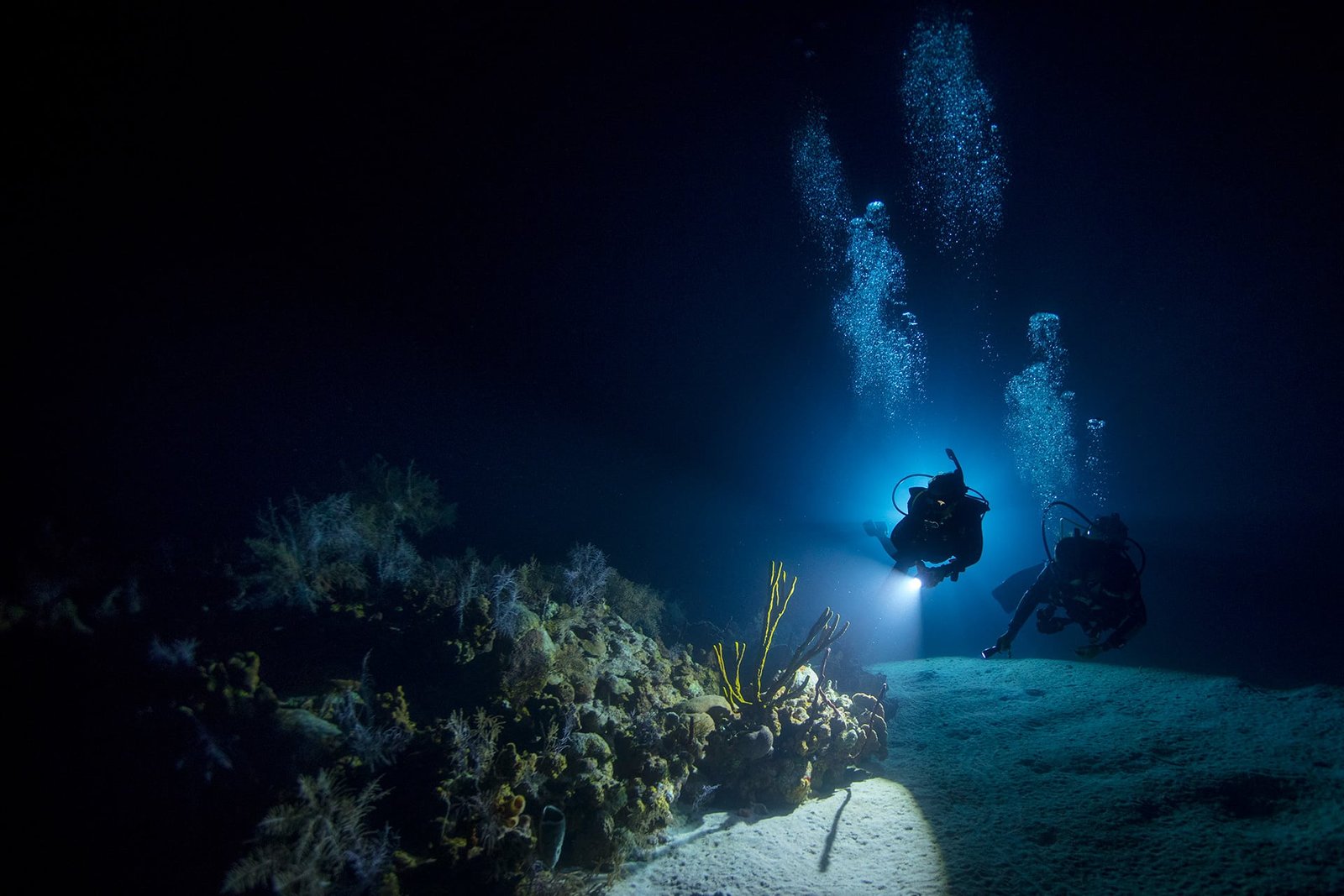
Is Night Diving Dangerous?
Night diving is not necessarily dangerous, as long as proper precautions are taken, and safety protocols are followed. In fact, it could be said that it’s equally “risky” as daytime diving.
However, there are certain potential risks associated with night diving that divers must consider and prepare for. Some of these risks include:
- Reduced visibility
- The possibility of losing sight of dive buddies
- Diminished perception of depth and orientation
To mitigate these risks, it is essential to have adequate training, follow established safety guidelines, and dive with an experienced buddy or a certified guide.
Additionally, the use of appropriate lighting equipment, mastery of underwater communication signals, and careful dive planning can significantly contribute to ensuring safety during night diving.
Is Night Diving Scary?
Most divers who have experienced night dives agree that once you’ve done one or two, the magic of being underwater at night will replace any fears you may have initially had. However, it’s perfectly normal to feel nervous at first.
If you’re afraid you won’t see what’s around you, don’t worry; dive lights are quite powerful, often allowing you to see much farther than during the day. Concerned about your light going out? That’s why carrying a backup is crucial, as mentioned in the essential equipment section.
Another common concern among novice divers is the presence of sharks and other deep-sea predators. However, dangerous encounters with a shark for the average diver are so rare that it’s not worth worrying about.
Since most night dives are conducted on reefs or in shallow waters, you don’t have to worry about deep-sea creatures rising from the depths. You’ll be able to see the “bottom” the whole time.
And remember, if you end up not liking night diving, that’s okay. There are many different types of diving, and everyone has different preferences.
Night Diving Signals
Just like when diving during the day, clear communication with your dive buddies is essential when night diving. Due to the lack of light, divers often use a combination of manual and light signals to communicate underwater.
To get your buddy’s attention, you can give them a tap or make noise, like lightly tapping your tank. You can also move your dive light from side to side, which usually works well if you can illuminate the bottom.
Once you have your buddy’s attention, you can use regular hand signals while shining your hand from above with your dive light, so your buddy can see it. Some signals will need to be adapted to one-handed versions. However, be careful not to accidentally shine your light in your buddy’s eyes; it’s neither pleasant nor safe to be temporarily blinded underwater.
Here are some common night diving signals:
- OK Signal: A circle with the dive light represents “okay.” It also serves as a question: “Are you okay?” and is used to respond with the same signal: Yes, I’m okay.
- Problem Signal: Moving the dive light from side to side signifies a problem or a diver in distress. You should wait for your buddy to be near you to explain the situation.
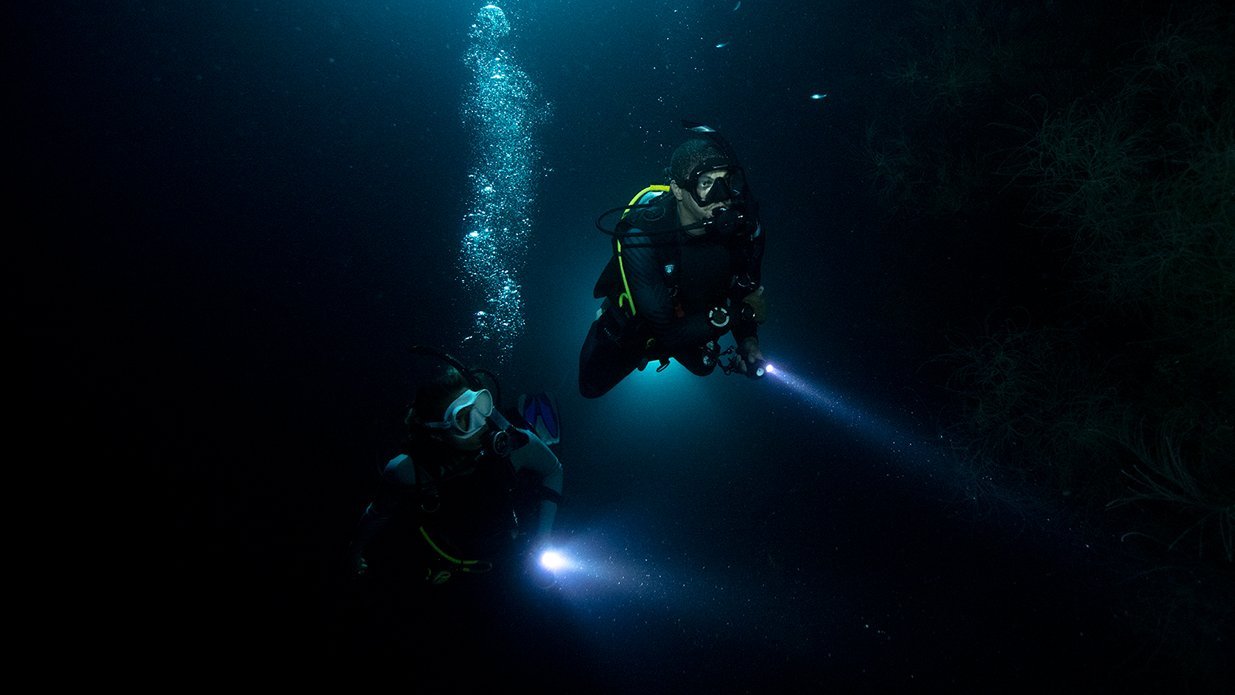
Tips for Night Dives
For a successful and safe night dive, careful planning and clear communication with your dive group are essential. Make sure to be familiar with specific underwater communication signals for night diving and practice them with your team before the dive.
Conduct a thorough equipment check before the dive, ensuring that all lights are functioning correctly. Keep calm and control your breathing underwater to fully enjoy the nighttime experience. Always respect the marine environment and follow established safety guidelines.
Here are some quick tips to keep in mind:
- If you ever feel uncomfortable, don’t hesitate to abort the dive.
- Whether due to lack of training, adverse weather or water conditions, an unsafe diver is always a risk to the team.
- Night dives should be done at shallow depths or in calm, shallow waters (less than 20 meters or 66 feet).
- Never attempt a night dive in an unfamiliar location you haven’t dived during the day.
- Never try night diving if you’ve consumed alcohol, recreational drugs, or other chemicals that may affect your decision-making abilities.
- Always go with a group of divers who can look out for each other.
- Don’t night dive from an unmanned boat, even if it’s tethered to your arm.
- Cave diving requires training. If you’re not trained, don’t attempt it. And lastly, if your lights aren’t properly charged, turn back.
- Attempting a night dive without proper illumination is very dangerous. Always carry a backup light.
